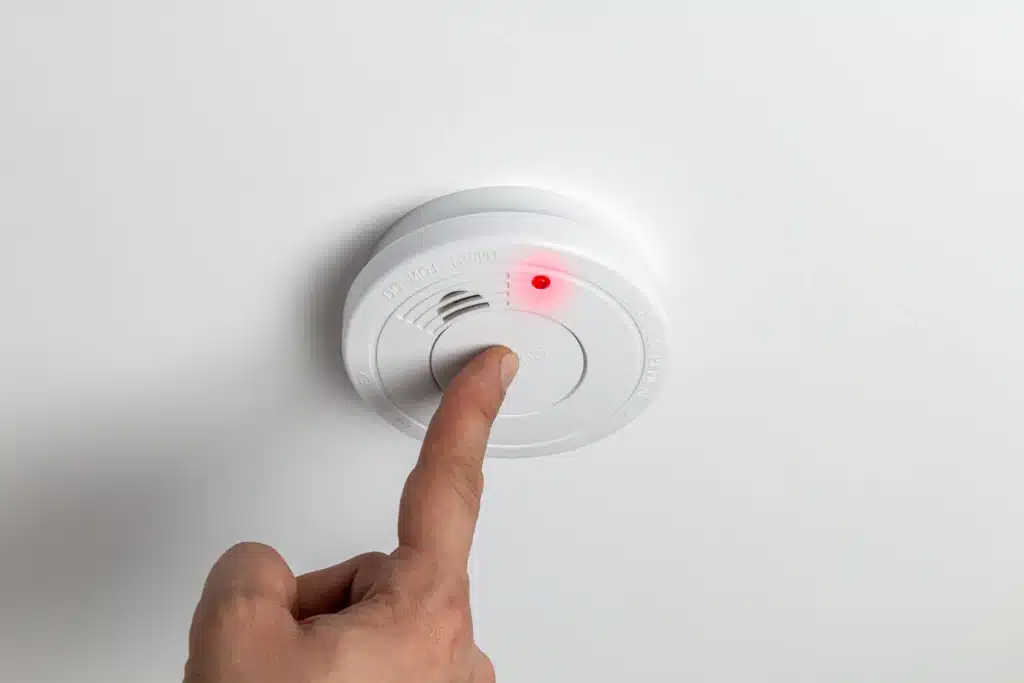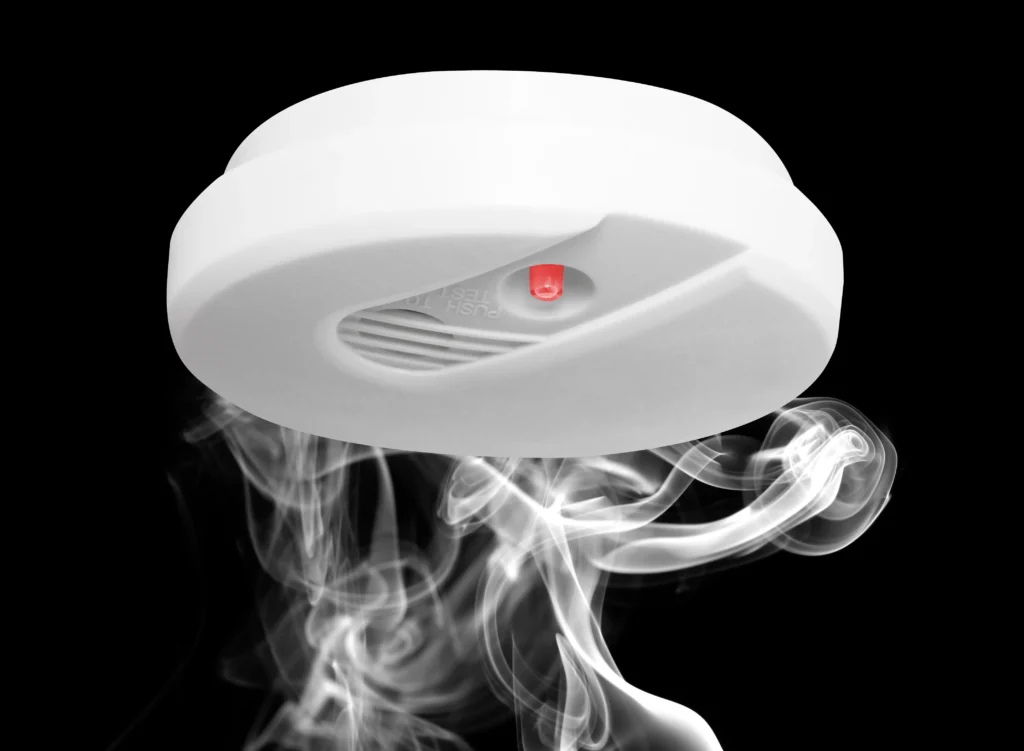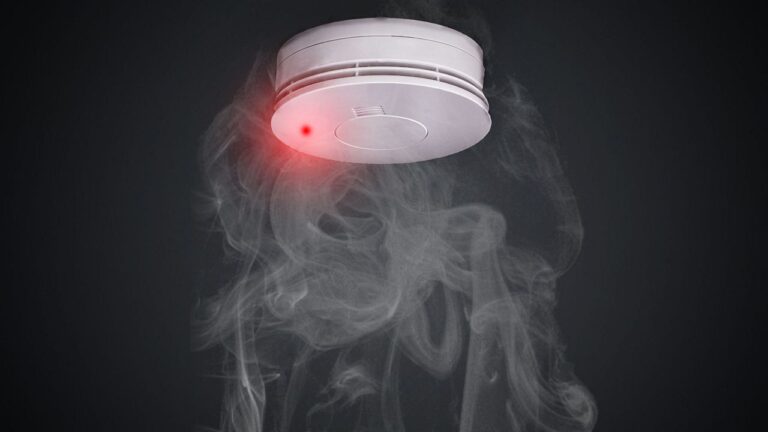Introduction
Does Smoke Detector Expire: Smoke detectors are an essential safety device in every home, alerting occupants to the presence of smoke and potential fire hazards. However, like any other electronic device, smoke detectors have a limited lifespan. Many people are unaware that smoke detectors can expire and may not function properly after a certain period of time. In this article, we will explore the question, “”Does smoke detector expire?”” and provide you with the information you need to ensure the safety of your home.
Firstly, it is important to understand that smoke detectors have a recommended lifespan set by the manufacturer. This lifespan is typically around 10 years, although it can vary depending on the specific model and brand. After this time, the smoke detector may no longer be reliable in detecting smoke or may fail to sound an alarm when needed. Therefore, it is crucial to replace your smoke detectors before they expire to ensure the safety of your household.
Second, smoke detectors might die from power loss. Most smoke detectors use replaceable or non-replaceable batteries. Maintaining replaceable smoke detector batteries requires annual replacement. Non-replaceable smoke detector batteries last and last. A dead battery means the smoke detector won’t work and must be replaced. Finally, smoke detector technology has enhanced safety and accuracy. Older smoke detectors may not satisfy safety standards or detect fires as well. To guarantee the safety of your house, consider updating to a modern smoke detector even if it’s still within its suggested lifespan.

How do I know if my smoke detector is outdated?
Smoke detectors are an essential safety feature in any home or building. They are designed to detect the presence of smoke and alert occupants to the potential danger of a fire. However, like any other device, smoke detectors can become outdated and less effective over time. It is important to regularly check and update your smoke detectors to ensure they are functioning properly and providing the necessary protection.
Age is one of the first symptoms of an outdated smoke detector. Smoke detectors typically last 10 years. Smoke detectors older than this should be replaced. The detector’s production date is normally on the back or in the instructions. To be safe, replace your smoke detector if you don’t know its age.
If your smoke detector lacks modern technology and functionality, it may be outdated. Wireless connections, voice alerts, and home-wide interconnection are common in newer smoke detectors. These characteristics can boost smoke detector performance and safety.
If your smoke detector doesn’t work, it may be outdated. Old smoke detectors often fail to sound during a fire, give false alarms, or have weak or intermittent sounds. If you have any of these issues, replace your smoke detector immediately to safeguard your safety.
Do hardwired smoke detectors expire?
Yes, hardwired smoke detectors do expire. While they may not have an expiration date printed on them like food or medication, it is important to understand that these devices have a limited lifespan. Over time, the components inside the smoke detector can wear out or become less effective, which can compromise their ability to detect smoke and alert you to a potential fire.
Sensor degradation is a major cause of hardwired smoke detector failure. Smoke detectors detect airborne smoke with ionization or photoelectric sensors. These sensors can degrade over time, making smoke detectors less accurate. The smoke detector’s batteries might also degrade over time, reducing its performance.
We recommend replacing hardwired smoke detectors after 10 years. This is because smoke detector sensors and other components can degrade after this time. Since the smoke detector was installed, technology may have evolved, and newer ones may function better.
To ensure their performance, hardwired smoke detectors need regular maintenance and testing. This includes cleaning the smoke detector frequently to eliminate dust and dirt from the sensors and pushing the test button to test its performance. If the smoke detector doesn’t sound or is feeble, it may need to be replaced.
How many years do smoke detectors last?
Smoke detectors are an essential safety feature in any home or building. They are designed to detect the presence of smoke and alert occupants to the potential danger of a fire. However, like any electronic device, smoke detectors have a limited lifespan.
The kind and upkeep of a smoke detector affect its lifespan. Smoke detectors typically last 8-10 years. Replacement of the detector should occur at this time for best performance. Smoke detector sensors might grow less sensitive with time, lowering their effectiveness.
Ionization and photoelectric smoke detectors are the major types. Ionization smoke detectors employ a small amount of radioactive material to detect smoke particles, while photoelectric detectors use light. Both types have pros and cons, but they live similarly.
Several variables can shorten a smoke detector’s lifespan. Dust and filth might impede the detector’s sensors and diminish its efficacy. Regular cleaning and maintenance extend smoke detector life. Power interruptions and electrical surges can potentially impair the detector’s lifespan.
Can you use a smoke detector that is older than 10 years?
Using a smoke detector that is older than 10 years is not recommended. Smoke detectors are essential safety devices that help protect lives and property by alerting occupants to the presence of smoke or fire. Over time, however, the effectiveness of a smoke detector can diminish, making it less reliable in detecting and alerting to potential dangers.
Smoke detectors are designed to have a lifespan of around 10 years. This is because the sensors and components inside the detector can become less sensitive or even fail over time. As a result, an older smoke detector may not be able to detect smoke or fire as effectively as a newer one. This can significantly increase the risk of injury or damage in the event of a fire.
Additionally, advancements in technology have led to the development of more advanced and efficient smoke detectors. Newer models often come with features such as interconnected alarms, which allow all detectors in a home to sound simultaneously when one detects smoke. This can provide valuable time for occupants to evacuate safely. Older smoke detectors may lack these advanced features, further compromising their effectiveness.
It is also important to note that smoke detectors have a limited lifespan due to the degradation of their internal components. Factors such as dust, humidity, and temperature fluctuations can accelerate this degradation. Regular maintenance, such as cleaning and testing, can help prolong the lifespan of a smoke detector, but it is still recommended to replace it after 10 years.
Do unopened smoke detectors expire?
Yes, unopened smoke detectors expire. Smoke detectors have a limited lifespan due to their components and technology, which may seem contradictory.
Fire alarms are loud from smoke detectors. They perform this crucial task with sensors and batteries. These parts can wear out and render the smoke detector unreliable.
Residential smoke detectors’ expiration dates let homeowners verify functionality. For best protection, replace smoke alarms before expiration. An expired smoke detector may miss a fire, risking lives.
Newer smoke detectors may be more effective due to safety and technology developments. Products are regularly enhanced for detection and battery life. Thus, even working smoke detectors should be replaced with newer models, especially if they are several years old.
The typical smoke detector lasts 10 years. Manufacturers and fire safety organizations recommend this lifespan for most smoke detectors. Smoke detector lifespans vary by kind and model.
Air is regularly screened for smoke by smoke detectors. Smoke detector components may degrade with time, reducing their effectiveness. Smoke detectors must be updated when they expire for best function and fire detection.
How long does a smoke detector typically last before it expires?
A smoke detector typically lasts for about 10 years before it expires. This is the recommended lifespan by most manufacturers and fire safety organizations. Over time, the components of a smoke detector can deteriorate, reducing its effectiveness in detecting smoke and alerting occupants of a potential fire. Therefore, it is crucial to replace smoke detectors once they reach their expiration date to ensure optimal safety.
During its lifespan, a smoke detector may require regular maintenance, such as replacing the batteries every six months and testing the alarm functionality. However, even with proper maintenance, the internal sensors and circuitry of the smoke detector can degrade over time, making it less reliable in detecting smoke particles. Therefore, it is essential to replace smoke detectors after the recommended 10-year period to ensure they are functioning at their best.
What are the potential risks or consequences of using an expired smoke detector?
Using an expired smoke detector can pose significant risks and consequences in terms of fire safety. When a smoke detector reaches its expiration date, it may no longer function properly or provide accurate detection of smoke or fire. This can result in delayed or even no alarm in the event of a fire, putting lives and property at risk.
One of the main risks of using an expired smoke detector is the increased likelihood of false alarms or no alarms at all. Over time, the sensors and components of a smoke detector can deteriorate, leading to reduced sensitivity or complete failure. This means that even if there is smoke or fire present, the expired detector may not be able to detect it and alert occupants in a timely manner.
Additionally, expired smoke detectors may also have outdated technology or lack important features that newer models possess. For example, newer smoke detectors may have advanced features like interconnected alarms, which can provide early warning throughout an entire home or building. Using an expired detector means missing out on these advancements and potentially compromising the safety of your home or workplace.
Is it necessary to replace a smoke detector once it has expired, or can it still function effectively?
It is absolutely necessary to replace a smoke detector once it has expired. While a smoke detector may still function to some extent after its expiration date, its effectiveness in detecting smoke and alerting occupants of a potential fire diminishes significantly. The expiration date is typically determined by the manufacturer based on the lifespan of the detector’s components, such as the sensors and batteries. Over time, these components can become less reliable and may fail to detect smoke or emit a loud enough alarm.
Using an expired smoke detector poses serious risks and consequences. In the event of a fire, an expired detector may not provide early warning signs, delaying the evacuation process and increasing the chances of injury or death. Additionally, an expired detector may produce false alarms or fail to sound an alarm altogether, leading to a false sense of security and potential property damage. Therefore, it is crucial to replace smoke detectors once they have expired to ensure the safety of occupants and minimize the potential risks associated with fire incidents.
Are there any specific guidelines or recommendations for replacing expired smoke detectors?
When it comes to replacing expired smoke detectors, there are a few guidelines and recommendations that can help ensure the safety of your home. The National Fire Protection Association (NFPA) recommends replacing smoke detectors every 10 years, as this is the typical lifespan of most models. However, it’s important to check the manufacturer’s instructions for your specific smoke detector, as some may have different expiration dates.
Additionally, it’s crucial to regularly test your smoke detectors to ensure they are functioning properly. This can be done by pressing the test button on the device. If the alarm does not sound or is weak, it may be a sign that the smoke detector needs to be replaced, even if it hasn’t reached its expiration date.
Furthermore, it’s important to replace smoke detectors immediately if they have been damaged or if they have been exposed to excessive dust, dirt, or humidity. These factors can affect the performance of the smoke detector and may render it ineffective in detecting smoke or fire.

Conclusion
Smoke detectors do have an expiration date. It is important to regularly check the expiration date of your smoke detector and replace it when necessary. This is because smoke detectors are designed to detect smoke particles in the air and alert you to potential fires. Over time, the sensors in the smoke detector can become less sensitive, reducing its effectiveness in detecting smoke. Therefore, it is crucial to ensure that your smoke detector is in good working condition to provide the best possible protection for you and your family.
Additionally, smoke detectors may also have a limited lifespan due to the deterioration of their internal components. The batteries in smoke alarm detectors can also lose their charge over time, rendering the device useless. It is recommended to replace the batteries in your smoke detector at least once a year, or as often as the manufacturer suggests. This will ensure that your smoke detector is always ready to detect smoke and provide early warning in the event of a fire.
Additionally, smoke detectors are not one-time purchases. For optimal performance, they need frequent maintenance and replacement. To guarantee good operation, test your smoke detector monthly. Press the device’s test button and listen for the alarm. The smoke detector may need replacing if the alarm doesn’t work. Smoke detectors save lives in fires. Keep track of their expiration dates and replace them as needed. Doing so will ensure that your home has dependable smoke detectors that will warn you and your family of fire threats.

